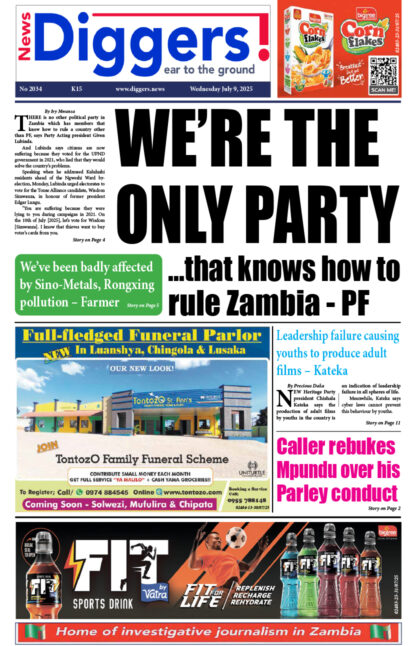MINES and Minerals Development Permanent Secretary Barnaby Bwalya Mulenga says although the law on declaration of gold as a strategic mineral has not yet been concluded, the guarantee of securing gold from the partnership between ZCCM-IH and Sudan’s Karma Limited was based on contractual obligations of the parties.
And Mulenga says partnerships in the processing of gold are meant to complement the government’s efforts to account for all gold in Zambia.
In a statement, Mulenga stated that government was aware of the many concerns raised by stakeholders on the gold partnerships but that it had declared gold a strategic mineral meant to benefit every citizen.
“ZCCM-IH Plc has partnered with Karma Limited, a company owned by Sudanese Nationals. Karma Limited set up a gold processing plant in Rufunsa at a cost of about USD$3.5 million. Later, the company partnered with ZCCM-IH Plc. That partnership has been actualised through a special purpose vehicle called the Consolidated Gold Company Zambia Limited (CGCZ). CGCZ has been granted a Mining Processing Licence in Rufunsa District where the company has approached two Licence holders namely Chembe Gold Mine Limited and Sabi Gold Mine Limited. The partnership is to use the mineral ore material from these mining companies to process gold. That partnership entails that 65% of the gold will be for CGCZ and 35% for the Licence holders,” Mulenga stated.
“Currently, CGCZ has applied for another Mineral five Processing Licence for Mumbwa where the company has approached a licence holder called Array Limited to utilize their mineral ore material. In other words, both CGCZ or Karma Limited are not undertaking any mining of the gold ore material but partnering with existing licence holders. All the gold recovered through this partnership shall all be sold to Bank of Zambia, as per government policy. Even though the law on the declaration of gold as a Strategic Mineral has not yet been concluded, the guarantee of securing the gold from this partnership comes from the contractual obligations of the parties and the directive to ZCCM-IH Plc by Government.”
On the Array gold ore processing agreement, he said that was a private transaction with CGCZ.
“The partnership in Mumbwa involves Array Limited supplying gold ore for processing to CGCZ in Mumbwa and Karma will invest USD$2.5 Million for the establishment of the processing Plant. This is a commercial transaction in which a private licence holder (Array Limited) elected to partner with CGCZ for the mineral ore material to be processed by CGCZ. The concept of partnering in business, is done for different reasons, including the fact that one would like to mitigate the risks of not having the technology to process,” Mulenga stated.
He stated that the current old policy did not state that gold would exclusively be mined, processed and handled by Zambians, but rather ensured that all gold from artisanal miners was bought through ZCCM-IH Plc to Bank of Zambia to build strategic reserves.
“Almost 92% of all licences in Zambia are owned by Zambians. The government policy in mining is to encourage both Local and Foreign Direct Investment (FDI) in the sector. Mining requires huge capital investment which prompts licence holders to borrow from Banks and other investors. Licence holders are free to use any lawful source of capital available to them to achieve the licence conditions…The Policy also tasks ZCCM-IH Plc to be involved in the opening of new gold mines at small and large scale levels, hence the involvement in Kasenseli in Mwinilunga,” Mulenga stated
“The policy does not entail grabbing or expropriating existing gold licences from the holders in favour of ZCCM-IH Plc, but rather encourage more gold mines to be established in the country whose gold production would end up with Bank of Zambia. Licence holders are free to partner with ZCCM-IH Plc to exploit the gold resources. This Policy has not been fully realized because the law is yet to be amended to actualize the policy aspirations. This is why gold producing companies such as Kansanshi Mines Plc are not currently compelled to sell the gold to Bank of Zambia. This Policy was approved by the government in October 2019. After the Policy, the legislative changes are required to implement the policy in full because before that, there is no legal basis to compel a mine licence holder to sell the gold to ZCCM-IH Plc. In line with the Policy, Cabinet on Wednesday 20th May 2020 approved a proposal from the Minister of Mines and Minerals Development, Richard Musukwa, MP for the Mines and Minerals Development Act to be amended.”
He further recognized concerns from citizens about the transactions that the ZCCM-IH had entered into in the mining and processing of gold.
“There have been concerns from various stakeholders on what the Zambian government position is in relation to gold and the partnerships ZCCM Investments Holdings Plc has entered into with Karma Limited and other stakeholders. The following is the explanation on the various aspects raised as concerns by the public and the Ministry position on the matters. Zambia is endowed with gold resources and the government remains committed to ensuring Gold benefits the people of Zambia. Government has declared gold as a Strategic Mineral meant to allow all citizens to benefit from its exploitation. This means gold must be differently handled compared to other Minerals in the country. In that vein, ZCCM-IH Plc has been mandated to coordinate efforts to purchase the gold from Artisanal miners and to also coordinate the gold trading business in Zambia,” Mulenga stated.
He stated that the country had 3,666 gold mining licences at the end of the first quarter of 2020.
“There are a lot of gold occurrences in Zambia involving almost all Provinces. The gold occurrences and resources are more pronounced in Eastern Province, North-Western, Central and Lusaka Provinces. Zambia is not fully mapped, meaning there are still areas of Zambia where we do not know what minerals are present at those locations. Gold exploration is even more difficult because in some areas, the exploration may not yield promising results of sufficient gold mineralization to justify commercial exploitation. However, sometimes what happens is that people later discover substantial quantities of gold e.g. in Mwinilunga, Kasenseli area, ” stated Mulenga.




















One Response
Karma, you had Paul Chanda chased.